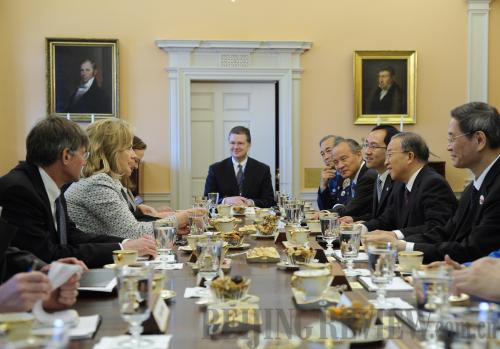|
 |
|
OPEN DISCUSSIONS: Chinese State Councilor Dai Bingguo (second right) and U.S. Secretary of State Hillary Clintonco-chair the strategic track of the third round of the Sino-U.S. Strategic and Economic Dialogue in Washington, D.C. on May 9 (ZHANG JUN) |

On May 9 and 10, the United States and China held the third round of their Strategic and Economic Dialogue (S&ED). This might well have been the most significant iteration of the dialogue since its launch in 2009.
This round of talks had two key objectives. The first was to build on the upturn in Sino-U.S. relations created by Chinese President Hu Jintao's visit to the United States in January 2011. The preceding year had been a tumultuous one that saw a suspension of military ties over U.S. arms sales to Taiwan, as well as tensions over the Dalai Lama, maritime issues, North Korea, and human rights. While one state visit alone could not be expected to magically resolve all those differences, it did facilitate progress in addressing some of them, for example, on North Korea, while helping the two countries redefine the tone and state of their relationship.
A second objective of the S&ED was to implement the commitments agreed upon by President Hu and President Barack Obama during the January visit, as encapsulated in a Joint Statement that reaffirmed the Sino-U.S. partnership and outlined several areas of cooperation, including new areas such as cyber security.
The two objectives were largely achieved. Despite obvious lingering differences over issues such as human rights and currency policy, both governments made it a point to publicly maintain a positive tone about the meetings. Also, some concrete steps were taken to improve economic, military and regional relations.
Moving forward, the key for both countries is to work on advancing the S&ED process, while being mindful of the need to continue managing the challenges to the bilateral relationship beyond these talks.
For example, both sides should build on the measured progress achieved by the S&ED in promoting economic trust and clean energy cooperation, and seek to bring about trust-building milestones in other aspects of the Sino-U.S. relationship, particularly in the political and security spheres.
The latest S&ED talks have shown an encouraging movement in that direction. The launch of the Strategic Security Dialogue (SSD), which involved for the first time senior military representatives from both sides, will facilitate much-needed civilian-military coordination aimed at preventing miscalculations between the two countries.
In providing a boost to the recently resumed military-to-military relations between China and the United States, the SSD also set the stage for the visit to the United States on May 15-22 by Chen Bingde, Chief of the General Staff of the People's Liberation Army. Indeed, the day after the S&ED was concluded, China's Ministry of National Defense expressed its commitment to a "new type" of military ties with the United States.
Another positive development is the newly established U.S.-China consultation on the Asia-Pacific region. This consultation draws on the Asia-Pacific focus of January's Joint Statement and will be useful for addressing mutual perceptions, including military perceptions, in the region. But it needs to be carried out in concert with assurances by the two countries to the rest of the region about their strategic intentions.
| 